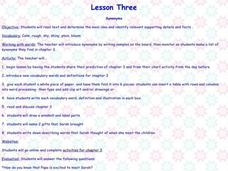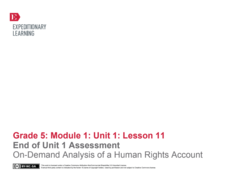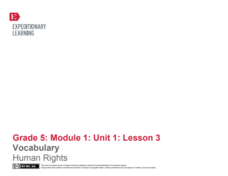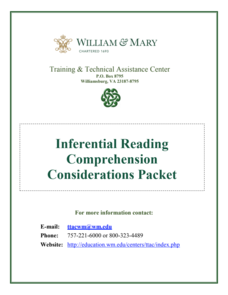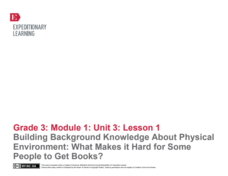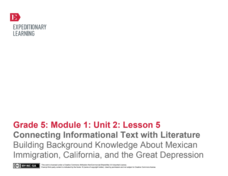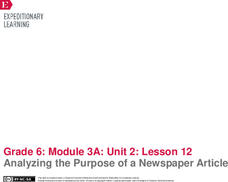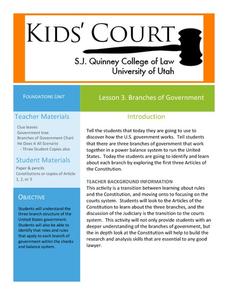Curated OER
Cloze Instruction And Herringbone Technique
Students sort out important information and create a visual framework for reviewing in the future. They organize a large quantity of information thus helping with learning and remembering details, cause and effect, comparison and...
Curated OER
Muggie Maggie - Lesson 6
Third graders read chapter 6 of Beverly Cleary's, Muggie Maggie, and complete associated activities. In this Muggie Maggie activity, 3rd graders complete vocabulary work. They examine punctuation marks used in the chapter, and make a...
Curated OER
Synonyms
Students examine synonyms from their reading. In this synonyms lesson, students use vocabulary from their reading to create a chart and illustrate the words. Students complete online activities from the story.
Curated OER
Scrapbook of Evidence
Students read three different genres of fiction. They create a story map and brainstorm possible collage inclusions. Each student prepares a minimum of two scrapbook page entries for each text or passage. Students write beside each...
Curated OER
Let's Get the Facts!
Young scholars observe and demonstrate the process of summarization. They discuss the three steps of summarization, then silently read a National Geographic Kids News article. As a class they complete a semantic map of the article, and...
Curated OER
Freckle Juice
Students complete activities with the book Freckle Juice by Judy Blume. In this literature lesson, students read chapter one and brainstorm adjectives for the four main characters. They make a page of vocabulary words and...
EngageNY
End of Unit 1 Assessment: On-Demand Analysis of a Human Rights Account
The last instructional activity in this unit about human rights consists of a final assessment. To demonstrate the skills your class has acquired throughout this unit, they will work with a new article entitled "From Kosovo to the United...
EngageNY
Taking Notes Using a Graphic Organizer: Inferring About the Importance of Religion in Colonial America
Improve class understanding of colonial times by reading an informational text and filling out the accompanying graphic organizer. Class members work with a partner to read, take notes, make inferences, and synthesize information.The...
EngageNY
Independent Reading: Building The Power of Stamina
The Incredible Book-Eating Boy is read aloud to young readers, and the story is discussed. Then, the lesson plan goes into how to build up one's reading stamina. The class brainstorms ways that they can build up their stamina such as:...
Cloud Front
Persuasive Speech Graphic Organizer
Support your learners during the speech-writing process with a five-page graphic organizer. Pupils have plenty of space to write in their evidence and arguments on this resource. The organizer provides some prompts for each section to...
California Education Partners
My Librarian is a Camel
A two-part assessment challenges scholars to gather information from reading then write an opinion piece. In part one, learners read, take notes, and answer text-related questions. In part two, participants use their new-found knowledge...
EngageNY
Introducing Module 4B: “Water Is Life”
Learners take a gallery walk around the classroom to view various images and quotes. As they walk, they write down what they notice and wonder about what they see. After discussing their notice and wonder notes, they read the...
Curated OER
Mini-Lesson Planning for Inferences
Making inferences and drawing conclusions is a key component to successful active reading. Encourage your class to use context clues and prior knowledge to infer different elements of a story, including the setting, plot, and character...
EngageNY
Vocabulary: Human Rights
Your class continues to explore the history of the Universal Declaration of Human Rights. In addition to learning about the background of this text, learners work on the skill of identifying and understanding key academic vocabulary....
Curated OER
Poetry As Oral Performance
Reciting poetry is a great way to build oral language skills and build classroom community. Pupils look at the text elements of poetry and choose a poem to read aloud. They focus on rhythm, fluency, and expression. This is a great way to...
William & Mary
Inferential Reading Comprehension Considerations Packet
Don't forget to read between the lines! Educators learn tips and activities to help scholars learn to infer to increase reading comprehension. Activities suggested include think alouds, backwards words, and who's who. the packet includes...
EngageNY
Building Background Knowledge About Physical Environment: What Makes it Hard for Some People to Get Books?
How far would your pupils go to be able to have access to books? Revisit Heather Henson and David Small's That Book Woman and challenge class members to take on the role of Cal or the Book Woman. By putting themselves in someone else's...
Achievement Strategies
CCSS Unit Design Template for PE
From baseball and tennis to capture the flag and four-square, here is a great document that will help you design your next unit on a sport-related activity.
EngageNY
Connecting Informational Text with Litearature: Building Background Knowledge About Mexican Immigration, California, and the Great Depression
Help your class transition as the setting in the novel Esperanza Rising, by Pam Muñoz Ryan, moves from Mexico to California. Beginning with prior knowledge, and moving into jigsaw research groups, class members add to and create posters...
EngageNY
Analyzing the Purpose of a Newspaper Article
Shh! No talking during the discussion! Using the resource, scholars engage in a silent discussion called a Chalk Talk activity to analyze the purpose of a newspaper article. Additionally, they read a model newspaper article and try to...
Curated OER
Lesson 3: Branches of Government
Young historians climb through the three branches of the US government in the third instructional activity of this five-part series. While reading the first three Articles of the Constitution in small groups, children write facts on...
California Academy of Science
Tropical Belt
Where in the world is the equator? Explore a world map with your class, coloring in oceans, continents, and rainforests while locating the three major lines of latitude: the equator, Tropic of Cancer, and Tropic of Capricorn. Discuss how...
Walters Art Museum
The Symbolism of Allegorical Art
Introduce learners to allegorical art with four bronze sculptures by Francesco Bertos. After modeling how to recognize bias and allegory in Bertos' Africa, class groups examine the other three sculptures in the series before creating...
Curated OER
Main Idea and Supporting Details
Second graders write topic sentences. For this writing lesson, 2nd graders construct a paragraph consisting of a topic sentence and 2-4 additional sentences. Students analyze their writing and publish a final copy.




